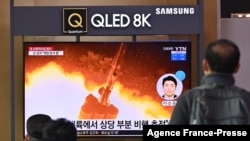Humanitarian experts say North Korea's missile tests are exacerbating food shortages in the country and making it harder for aid organizations to deliver humanitarian assistance.
North Korea conducted a succession of missile tests in January with the latest launch of what it called a Hwasong-12 type intermediate-range missile on Sunday marking its seventh test and eleventh missile fired this year.
The tests came just days after North Korean leader Kim Jong Un vowed his regime would devote much of its attention in the new year toward "making radical progress in solving food, clothing and housing problem [sic] for the people," according to Korean Central News Agency (KCNA), the state news agency.
Kim made the speech in the last five days of 2021 at the ruling Workers' Party of Korea (WPK), according to KCNA on January 1. The first missile launch of 2022 came on January 5.
Kim acknowledged in June during the plenary meeting of the WPK that the country was going through a "tense" food situation partly due to the previous year's typhoon and floods.
Diverting resources
Jerome Sauvage, former U.N. resident coordinator in North Korea from 2009 to 2013, said, "The huge national expenditure on security — especially nuclear security — is preventing the North Korean leadership from properly taking care of their people."
Sauvage continued, "Whereas the North Korean regime is concerned with the health and nutrition of their people, that concern remains a [secondary] priority after security, which takes precedence over every other consideration."
Esther Im, program manager at the National Committee on North Korea (NCNK), a U.S.-based nongovernmental organization founded by Mercy Corps, said the heightened security situation hampers humanitarian work in North Korea.
"A heightened security situation on the Korean peninsula does not make the provision of humanitarian assistance easy and will require intentional actions to ensure that such provision of assistance, if and when it resumes, can reach the neediest, especially in this moment of critical need," Im said during a recent interview with VOA Korea.
Cost of missile launches
North Korea's record 11 missiles launched in January could have cost North Korea $33 million to $110 million, based on figures provided by Bruce Bennett, a senior defense analyst at the RAND Corporation.
Bennett said including fuel and other expenses, Pyongyang's testing of a single missile could cost from $3 million for a short-range missile to $10 million for a long-range missile.
"That's what it's costing North Korea when [its labor costs] are very cheap," said Bennett. "These are very rough estimates, and they are nothing like what it would cost the United States to do missile tests."
The missiles Pyongyang tested in January include what it claims to be hypersonic missiles, tactical guided missiles, cruise missiles, ballistic missiles and an intermediate-range missile seen as the longest-range ballistic missile Pyongyang has tested since 2017, capable of reaching the U.S. territory of Guam.
If North Korea spent about $5 million on each test, according to Bennett, the total 11 missiles North Korea launched in January cost them $55 million.
If an average global rice price is estimated to average about $1,000 per ton, North Korea could have purchased 55,000 tons of rice with $55 million, said William Brown, a former CIA analyst who closely monitors the North Korean economy.
Sauvage said, "A series or a succession of missile tests will not impact an immediate shipment" of aid delivery by humanitarian organizations. However, "it will impact the decision of the international community to organize the delivery of humanitarian aid" including planning for fundraising to arrange the shipment of aid, he added.
A State Department spokesperson told VOA Korea on Monday that the U.S. is committed to supporting international aid efforts "to alleviate the suffering of the people" even as it disagrees with the government of North Korea.
Deepening food crisis
Prolonged pandemic border closures that Pyongyang has imposed since January 2020 have worsened North Korea's food situation.
The U.N.'s Food and Agricultural Organization (FAO) estimated North Korea needed 1.1 million tons of cereal imports from 2020 to 2021 to cover inadequate domestic production. With commercial imports of 205,000 tons planned, the organization estimated approximately 860,000 tons of food equivalent to 2.3 months’ worth of food are needed.
The last food aid distributed in North Korea was 891.5 metric tons (mt) of fortified food and 4,970 mt of raw food commodities to 566,886 people in March by the World Food Program (WFP), according to the organization's country brief in December.
WFP's country director was the last U.N. aid worker to leave the country in March, following the exodus of humanitarian aid providers forced to leave the country since the lockdown that has severely restricted trade.
A WFP spokesperson told VOA's Korea on Monday, "Prior to [the COVID-19] pandemic, DPRK already had chronic food insecurity and malnutrition and substantial humanitarian needs."
The spokesperson, who used the acronym for North Korea's official name, the Democratic People's Republic of Korea, continued, "We assume that the effects of border closure and natural disasters may have further exacerbated it."
A spokesperson for the U.N. Office for the Coordination of Humanitarian Affairs, said, "The U.N. stands ready to provide assistance to the people in support of the government's efforts. We hope the situation evolves positively to allow our international staff and supplies to enter as soon as possible."
Soyoung Ahn and Jiha Ham contributed to this story.





